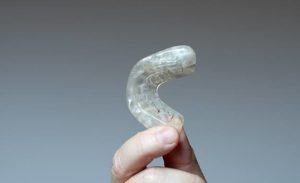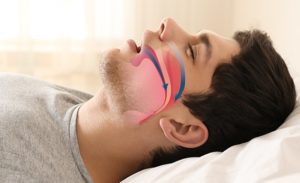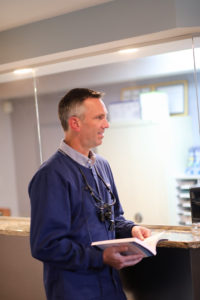ATTENTION ATHLETES
March 28, 2022
I was at a continuing education seminar last week and one of the topics being discussed was mouthguards. Although it seems basic, and you would think that everyone who should be wearing one does, this is far from the case. I still see far too many sports related dental injuries in every season which could have been prevented.
Any sport that presents the chance of contact or collision with another person, object, or surface can potentially cause injury to teeth, jaws, and oral soft tissue. These sports include, but are not limited to, football, baseball, basketball, soccer, hockey, field hockey, pond hockey, boxing, lacrosse, biking, inline skating, and skateboarding.
Teeth get in the way. Other than your nose, front teeth are “out there” and your lips only provide minimal protection. For example, a student I saw this past spring from a local private school was playing squash. Squash is a non-contact sport but the game is played in close proximity to another player with a swinging racquet. The student I treated had been hit in the mouth with the other player’s racquet. He required a root canal on one front tooth and a crown. The other front tooth needed to be extracted and replaced with a dental implant. All of this could have been prevented with a mouthguard.
A custom mouthguard made by your dentist covers the upper teeth with a soft, flexible material that can prevent many injuries. It decreases the chance of the lower jaw jamming into the upper jaw or being pushed back into the temporomandibular (jaw) joint. Mouthguards may reduce the severity and incidence of concussions as well.
Custom mouthguards, made by a dentist, fit 100 times better than anything you can buy in a store. This not only improves performance (making it easier to breathe), but also makes it more likely the athlete will keep the mouthguard in.
Custom-made mouthguards may be a little more expensive than over-the-counter versions, but they are far superior, and that is enough reason to consider them. Inform your dentist if you or your child participates in sports or recreational activities. Because mouth injuries can be painful, costly, and life-changing, it is recommended that all athletes take preventative measures at all times.
At my seminar this past week the presenter noted that injury to the teeth from sport injuries creates life-long issues that can run in the 10’s of thousands of dollars to maintain over a lifetime. The $100 or so that it costs to have a well-fitting custom guard made, that will be worn more often because it fits well, is worth every penny. It kills me to see children and adults come in with injuries to their once beautiful front teeth. The best dentistry is no dentistry because even the best dentistry needs to be maintained and/or replaced, sometimes multiple times over a lifetime.
Even if it isn’t “cool” to wear a mouthguard in the sport you are playing, strongly consider it anyway. You only get one set of your own teeth. Custom guards can be made with fancy colors and designs. You never know, you may start a trend….and who cares what other people think; these are your teeth!
Dr. St. Clair maintains a private dental practice in Rowley and Newburyport dedicated to health-centered family dentistry. He has a special interest in treating snoring, sleep apnea and TMJ problems. If there are certain topics you would like to see written about or questions you have, please email them to him at 
SNORING
March 21, 2022
 It is not uncommon for me to get a strange look when I ask a patient about snoring in the dental office. After an explanation about some of the reasons I include this on my medical history form, the patient will often say, “Well, I don’t snore but my spouse (usually husband) does. In fact, we sleep in separate bedrooms.”
It is not uncommon for me to get a strange look when I ask a patient about snoring in the dental office. After an explanation about some of the reasons I include this on my medical history form, the patient will often say, “Well, I don’t snore but my spouse (usually husband) does. In fact, we sleep in separate bedrooms.”
A better way to ask someone about snoring is to ask, “Have you been told you snore?” Snoring can be a huge nuisance to the bed partner and is actually very detrimental to both people. For those without a bed partner, snoring can be assessed with apps such as Snore Lab, which measures snoring levels throughout the night.
Snoring is a sign of a restricted airway, which means that there is a possible depletion of air getting into the lungs and thus the brain. You spend approximately one third of your life sleeping, which means if you live to 90 years old, you may have spent 30 years sleeping. Oxygen depletion during sleep has both short-term and long-term consequences. I have read multiple studies which suggest a reduction of oxygen to the body can take 6-10 years off of your life. Sleep is one of the most mysterious states of being – we don’t know a lot about what is going on during sleep without it being recorded. Wouldn’t you want to know if your body wasn’t being oxygenated properly?
A restricted airway can be caused by numerous different factors. Many times, it is developmental and starts early in life. As we age, this risk for developing a restricted airway increases with things like gaining weight, muscle tone laxity, and even sleep position. Snoring is a fluttering of soft tissue in the back of throat due to there not being enough space for air to pass through. Not only does snoring have the potential to affect your brain and the way you feel on a day-to-day basis, it also disturbs the sleep of the person sleeping next to you….and in some cases, people in other rooms.
Snoring does not mean you have sleep apnea (a serious disorder measured by a sleep test,) but is a significant risk factor. If you do have sleep apnea, you need to know this so that it can be treated and you can live a better quality of life. If you don’t have sleep apnea and just snore, this can also be treated, and you may be able to make it back into your own bedroom.
Aside from snoring, if you have any of the following: familial history of sleep apnea, history of daytime drowsiness, history of clenching/grinding, history of TMJ disorder, history of mood disorders/depression, witnessed apnea events (gasping at night), large tongue with ridges on the sides, tooth wear, high blood pressure, gastric reflux, large neck (Males >17 / Females>16) – you should discuss this with your physician and/or your dentist.
There are different ways to treat snoring and/or sleep apnea including positional therapy (sometimes a wedge pillow strapped to your back so you can’t roll onto your back), a CPAP device (positive air pressure through the nose to keep the airway open), or a dental device (to keep the jaw and tongue from falling back).
Just like exercising and good eating habits are good for the body, quality sleep vital to good health. Just because you get 7-8 hours of sleep doesn’t mean it is good sleep. Don’t hesitate to talk with your doctors about your sleep issues…..and encourage the loud person sleeping next to you to do the same.
Dr. St. Clair maintains a private dental practice in Rowley and Newburyport dedicated to health-centered family dentistry. He has a special interest in treating snoring, sleep apnea and TMJ problems. If there are certain topics you would like to see written about or questions you have, please email them to him at jpstclair@stclairdmd.com
ASK THE DENTIST
March 7, 2022
 I understand that periodontal disease is a major cause of tooth loss in adults, but is there anything I can do about it?
I understand that periodontal disease is a major cause of tooth loss in adults, but is there anything I can do about it?
Gum disease—periodontal disease—often progresses slowly, without pain, over a long period of time. This is one reason why it is common among older adults. The longer the disease goes undetected and uncontrolled, the more damage it causes to gums and other supporting tissues. Although periodontal disease is caused by bacteria, other factors can increase the risk or severity of the condition. These include food left between the teeth, tobacco use, badly aligned teeth, ill-fitting bridges or partial dentures, poor diets and some systemic diseases such as diabetes.
Although periodontal disease is common, it can be controlled but is often a life-ling commitment. In its early stages, it can be reversed. Treatment of advanced cases may require surgery. If you notice any of these: bleeding gums when you brush; red, tender or swollen gums; gums that have pulled away from the teeth; pus between your teeth and gums when the gums are pressed; loose teeth or teeth that are moving apart; any change in your bite; any change in the fit of your partial dentures; constant bad breath or bad taste…….this may mean you have severe gum disease and are losing your teeth!
Prevention is key!
My dentures don’t feel as comfortable as they once did. Before I see the dentist, should I try some different products myself to try to improve them?
Your dentures were made to fit precisely. If they are cared for properly, they do not change shape. They can become loose due to natural changes in the gums and bone supporting them. As the jawbone begins to shrink, so do the gums. In addition, the teeth wear over time and become less effective during chewing. Most dentures should be replaced every 5-8 years.
When your dentures do not fit properly, see your dentist as soon as possible so adjustments can be made. Professional relining of the denture may extend its lifespan.
Do not try to change the fit of your dentures yourself. This can damage them and make them unrepairable.
If I have full dentures, do I really need to see the dentist as often as before?
Even if you no longer have your natural teeth, you should see your dentist once a year for an oral examination. The dentist will examine your mouth to check for any problem with the gum ridges, the tongue and the joints of the jaw, as well as screen for oral cancer. For a variety of reasons, many older adults are more susceptible to oral diseases, including oral cancer. About 95 percent of all cancers are found in people over age 40. However, many of these cancers are treatable if detected early. Oral tissues are also checked for signs of other diseases that can first manifest themselves in the mouth.
I am currently taking medication that my physician prescribed for me. Can this affect my dental treatment?
When your dentist asks for your medical history, be sure to provide complete, up-to-date information on your health. Inform your dentist if you have experienced recent hospitalization or surgery, or if you have recently been ill. Also tell the dentist the names, doses and frequency of any medications you are taking, whether prescription or over-the-counter products, and the name of your physician. This information will help the dentist to select the most safe and effective method of treatment for you.
Dr. St. Clair maintains a private dental practice in Rowley and Newburyport dedicated to health-centered family dentistry. He has a special interest in treating snoring, sleep apnea and TMJ problems. If there are certain topics you would like to see written about or questions you have, please email them to him at jpstclair@stclairdmd.com







